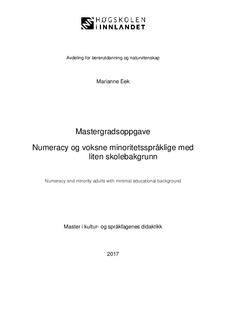Numeracy og voksne minoritetsspråklige med liten skolebakgrunn.
Master thesis

Åpne
Permanent lenke
http://hdl.handle.net/11250/2457408Utgivelsesdato
2017Metadata
Vis full innførselSammendrag
Norsk:
Numeracy, eller grunnleggende ferdigheter i regning, kan anses som en tilgangskompetanse i samfunnet, og en nøkkel til deltagelse på mange samfunnsarenaer. Alle mennesker, uansett kulturbakgrunn, har med seg en numeracitetshistorie. Numeracy-ressurser som voksne minoritetsspråklige med liten skolebakgrunn sitter inne med kan imidlertid være tilpasset behovene i andre kontekster, og ikke nødvendigvis kravene til deltakelse i det norske samfunnet.
Dette prosjektet undersøker hva et intervju med tolk kan avdekke av numeracy-ressurser hos tre voksne minoritetspråklige med liten skolebakgrunn. Analysen viser at intervjupersonenes numeracy-erfaringer og -kunnskaper har sammenheng med forhold, behov og aktiviteter i hjemmekulturen, om det gjelder tid, måling, penger eller lokalisering. De har behov for en ytterligere tilegnelse av numeracy-ferdigheter på disse områdene som er tilpasset en norsk kontekst, men som bygger på de ressursene intervjupersonene allerede har. Resultatene peker også mot at intervjupersonene har behov for en styrking av grunnleggende tallforståelse og regnestrategier for å få et godt grunnlag for den videre numeracy-undervisningen. Det er imidlertid begrenset hvor mye en rekker i løpet av et totimers intervju, og undersøkelsen viser at det er behov for flere samtaler med intervjupersonene om hverdagserfaringer og arbeidserfaringer som kan relateres til numeracy.
I et intervju med tolk kan den voksne minoritetsspråklige med liten skolebakgrunn få ytre seg på sitt eget morsmål, eller på et av sine sterkeste språk, om forhold som kan knyttes til numeracy. Dette kan gjøre det mulig å overføre kunnskaper, begreper og strategier på tvers av språk. Å få fortelle på morsmålet om erfaringer og kunnskaper fra hjemmekulturen kan også gi en erfaring av identitetsbekreftelse. Som undersøkelsen viser, er det imidlertid mange forhold som virker inn på et intervju, for eksempel intervjupersonens tidligere erfaringer og relasjonen og interaksjonen mellom deltakerne i intervjuet. Hvilken språklig varietet tolkingen foregår på har også betydning. Gjennomført og fortolket på en refleksiv måte har imidlertid metoden potensiale til å gi et innblikk i numeracy-ressurser hos den aktuelle målgruppen som den videre undervisningen kan bygge på. English:
Numeracy, or basic mathematical skills, can be seen as a competence that gives access to society, and as a key to participation on several arenas in a community. All people, regardless of cultural background, bring their own numeracy-story. However, numeracy-resources that minority adults with minimal educational background possess can be tuned to needs in other contexts, and not necessarily the demands made upon the citizens in Norwegian society. The current study examines what an interview with an interpreter can uncover of the numeracy-resources that minority adults with minimal educational background possess. The analysis shows that the interviewees’ numeracy-experiences and -knowledge have connections with conditions, needs and activities from their culture, be it time, measurement, money or localization. There is a need of further acquirement of numeracy-skills in these areas adapted to the Norwegian context, but build on the interviewees’ already existing resources. The results also show that the interviewees are in need of a strengthening of basic numerical knowledge and numerical strategies to gain a solid foundation for further numeracy-teaching. However, there are limitations as to what is possible to cover during a two hours interview, and the inquiry reveals the need for further conversations with the interviewees about everyday-experiences and work practice that have connections with numeracy.
An interview with an interpreter can provide minority adults with minimal educational background a possibility for expressing themselves in their mother tongue, or other languages in which they have a higher proficiency, about conditions connected with numeracy. This can make a transfer of knowledge, conceptions and strategies across languages possible. To express oneself in one’s mother tongue concerning experiences and knowledge from the home culture also have the possibility to give an experience of identity affirmation. However, as the inquiry reveals, there are several circumstances that influence the interview situation, whether it is the interviewees’ previous experiences or the relation and interaction between the participants of the interview. It is also of importance in which variety of the language the translation and interview is conducted. However, the method has the potential to give glimpses into the numeracy-resources of the relevant target group if it is implemented and interpreted in a reflexive way, which can constitute a stepping stone for further education.
Beskrivelse
Mastergradsoppgave i kultur- og språkfagenes didaktikk, Avdeling for lærerutdanning og naturvitenskap, Høgskolen i Innlandet, 2017.